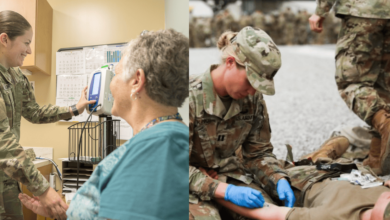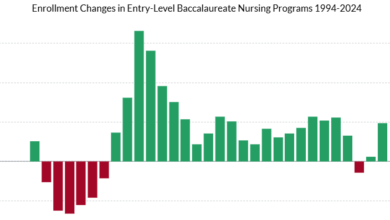Study Reveals Alarming Statistics on Nurse Burnout

Healthcare market research and consulting company PRC recently announced the results of its National Nursing Engagement Report. The report was based on survey findings from over 2,000 healthcare partners and revealed key data about nurses in the workforce today, as well as what the future will hold for nurses and how hospital administrators can help support nurses going forward.
One of the main focuses of the study was to examine how many nurses in the workplace today report feeling burned out. According to the report, 15.6% of all nurses reported feelings of burnout, with the percentage rising to 41% of “unengaged” nurses. What’s really interesting as well, is that 50% of nurses who reported feeling burned out also reported that they had no plans to leave their organization—pointing to the importance of supporting and meeting nurses where they are at in the workforce.
The report explained that unengaged nurses are nurses who,
- May not be part of a team with their colleagues,
- Have diminished morale,
- Feel emotionally checked out from their work, which also ultimately affects their patient care.
Factors such as autonomy, nurse-to-nurse teamwork and collaboration, staffing and resources, interpersonal relationships, and leadership access and responsiveness were all factors in nursing engagement.
ER nurses also seemed to be at a higher risk for burnout, with 20% of ER nurses reporting feeling unengaged.
“Burnout is an important topic in healthcare today,” the report’s authors, Cynthia King, Ph.D., MA, Director Client Organizational Development, PRC and Leigh Ann Bradley, Ph.D., MSN, MA, BS-CHE, RN, Executive Coach & National Speaker, PRC Excellence Accelerator, explain.
“We are asking nurses to do more with fewer resources. At the same time, nurses must be compassionate caregivers, technical experts, clinicians, and experts.”
King and Bradley tell Nurse.org that one of the most exciting findings of the data was the fact that there is a statistical significance between nurse engagement and patients having better experiences. “To us, this highlights the sacred nature of the patient/nurse relationship,” they note.
You mean when nurses feel more supported at work, they are better able to do their job and care for patients? What a revolutionary idea!
Fortunately, however, 85% of nurses did report feeling engaged or fully engaged, so continuing to support nurses, while also exploring ways to support those who are finding engagement to be lacking, is imperative.
“We believe it is important for healthcare leaders to support and grow an engaged workforce,” they add. “At the same time, leaders need to determine ways to restore joy and purpose to nurses whose engagement has diminished.”
And as the report details, the demand for nurses will increase by 15% by 2026, so it’s more important than ever that nurses feel supported and engaged in the field. King and Bradley also explain that the report revealed that in order to improve engagement, hospital administrators need to primarily focus on three things:
Involve nursing leaders and professionals as active participants in decision making impacting the organization and patient care. It is important that nurses know their opinions are valued by leadership.
Create environments in nursing units where there are respect, teamwork, and collaboration between nurses and other healthcare professionals.
Make leadership accessible to nurses and be responsive to their needs. Having trusting relationships between nursing and the senior leadership of an organization is critical.
Despite the reputation that millennials get about working, King and Bradley tell Nurse.org that their research found that all generations—millennials included—are “deeply committed” to the nursing profession. Despite the fact that millennials have a slightly lower percentage of engagement, they also share the same goals and dedication as all other generations studied.
Thus, the report only reveals how important it is for nurse leaders to invest time in building relationships and exploring ways to support millennial nurses. Millennial nurses, as part of a different generation of nurses, may have their own unique needs than past or even future generations, but the paper authors point out that uncovering those expectations and needs will only help improve nurse engagement, retention, and patient care.
Overall, the report provides an important landscape for defining what factors are necessary to help nurses feel engaged in the workplace, what may lead to nurse burnout, and how to move forward to ensure that the needs of nurses in all generations are identified and valued.
“Too often nurses are so focused on caring for others, [so] we need to create a safe place to care for nurses,” King and Bradley summarize. “We want to create climates where employees can speak up for help if they are experiencing signs and symptoms of burnout.”






